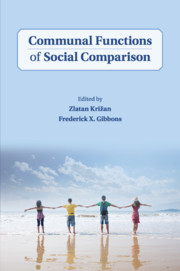Crossref Citations
This Book has been
cited by the following publications. This list is generated based on data provided by Crossref.
Chard, Sarah
Harris-Wallace, Brandy
Roth, Erin G.
Girling, Laura M.
Rubinstein, Robert
Reese, Ashanté M.
Quinn, Charlene C.
and
Eckert, J. Kevin
2016.
Successful Aging Among African American Older Adults With Type 2 Diabetes: Table 1..
The Journals of Gerontology Series B: Psychological Sciences and Social Sciences,
p.
gbw119.
Beekman, Janine B.
Stock, Michelle L.
and
Howe, George W.
2017.
Stomaching rejection: Self-compassion and self-esteem moderate the impact of daily social rejection on restrictive eating behaviours among college women.
Psychology & Health,
Vol. 32,
Issue. 11,
p.
1348.
Kretz, Valerie Ellen
2020.
The International Encyclopedia of Media Psychology.
p.
1.
Aime, Federico
Hill, Aaron D.
and
Ridge, Jason W.
2020.
Looking for respect? How prior TMT social comparisons affect executives' new TMT engagements.
Strategic Management Journal,
Vol. 41,
Issue. 12,
p.
2185.
Hogg, Michael A.
2021.
Uncertain Self in a Changing World: A Foundation for Radicalisation, Populism, and Autocratic Leadership.
European Review of Social Psychology,
Vol. 32,
Issue. 2,
p.
235.
Zell, Ethan
and
Lesick, Tara L.
2021.
Taking Social Comparison to the Extremes: The Huge-Fish-Tiny-Pond Effect in Self-Evaluations.
Social Psychological and Personality Science,
Vol. 12,
Issue. 6,
p.
1030.
Soekmawati
Nathan, Robert Jeyakumar
Victor, Vijay
and
Pei Kian, Tan
2022.
Gym-Goers’ Self-Identification with Physically Attractive Fitness Trainers and Intention to Exercise.
Behavioral Sciences,
Vol. 12,
Issue. 5,
p.
158.
Crusius, Jan
Corcoran, Katja
and
Mussweiler, Thomas
2022.
Theories in Social Psychology, Second Edition.
p.
165.
Koinig, Isabell
2022.
Picturing Mental Health on Instagram: Insights from a Quantitative Study Using Different Content Formats.
International Journal of Environmental Research and Public Health,
Vol. 19,
Issue. 3,
p.
1608.
Hogg, Michael A.
2023.
Walls between groups: Self‐uncertainty, social identity, and intergroup leadership.
Journal of Social Issues,
Vol. 79,
Issue. 2,
p.
825.
Stockus, Christopher A.
and
Zell, Ethan
2023.
The regional big‐fish‐little‐pond effect: Evidence from national and subnational comparisons.
British Journal of Social Psychology,
Vol. 62,
Issue. 3,
p.
1158.
Poppi, Fabio Indìo Massimo
2024.
In Dubio Pro Reo: The Impact of Certainty and Uncertainty on the Identities and Beliefs of an Organized Crime Member.
Deviant Behavior,
Vol. 45,
Issue. 8,
p.
1126.
Stockus, Christopher A.
and
Zell, Ethan
2024.
Empathic forecasting of the big-fish-little-pond effect.
Cognition and Emotion,
Vol. 38,
Issue. 1,
p.
44.
Stockus, Christopher A.
and
Zell, Ethan
2024.
Moderators of the big‐fish‐little‐pond effect in educational settings: A scoping review.
Social and Personality Psychology Compass,
Vol. 18,
Issue. 1,



